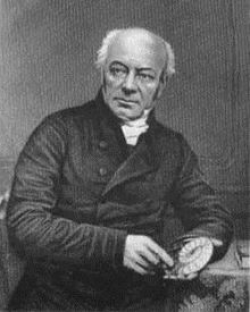William Buckland

- Born
- 12 March 1784
- Died
- 14 August 1854 (age 70)
William Buckland was a 19th century geologist, palaeontologist and theologian. A pioneering scientist, Buckland was the first person to describe an artefact now instantly recognisable in countless museums around the world - the fossil of a dinosaur. A Devon boy born and bred, he was an eccentric and wonderful character whose legacy has even been left on the Moon – a ridge called the Dorsum Buckland is named after him.
Buckland grew up in Devon, England, which has long been famous for its abundance of fossils from the Jurassic period. He would often accompany his dad on walks, collecting fossil shells and developing his love for finding fossils.
Attending Oxford University, Buckland attended many lectures on mineralogy and chemistry, and frequently went out in his spare time and on holidays around the Devon coast.
He went on to become the Dean of Westminster, while still keeping alive his passion for fossil hunting. He loved it so much that his honeymoon consisted of a year travelling around Europe exploring all of the great geological sites. Luckily his wife enjoyed it just as much as he did, and they ended up having nine children together, one of which became a well-known naturalist.
Buckland is probably most famous for writing the first ever account of a dinosaur fossil and giving it the name Megalosaur (great lizard), which was later changed to dinosaur. He also promoted the glaciations theory, first described by Louis Agassiz, after coming upon geographical evidence for it- however he first thought this was evidence for the biblical flood!
As a fellow of the Royal Society, he spent much of his time trying to make sense of the Bible in relation to the geological and palaeontological discoveries that were being made. He came up with many new hypotheses, including the idea that the time between the Earth’s origins and the creation of modern-day plants and animals was filled with a series of extinctions and creations. This was a very adaptable way of thinking for somebody stretched over two seemingly opposed disciplines.
Buckland lived a long and fulfilled life that was full of eccentricities and an array wonderful scientific work, which was even carried on into his death. Having reserved a grave plot, the gravedigger began to prepare it only to find it lay under a mass of Jurassic Limestone that had been exploded and excavated, assumingly by Buckland himself. It was one last nod from the theologian dinosaur hunter from Devon.



